This is the first article of the “Monitoring the pillars of democracy” series. It focuses on the seven pillars essential to defending democracy, as outlined in the Brookings Democracy Playbook 2025 published by the Anti-Corruption, Democracy, and Security (ACDS) project. The series includes research and commentary on actionable steps democracy actors can take to strengthen democratic institutions and protect freedoms in the U.S. and abroad.
In the days before the Trump administration took office, we recognized, as did many others, the imminent threats to U.S. democracy. That is why we published the 2025 edition of the Democracy Playbook. We outline seven pillars essential to defending democratic governance, freedoms, and the rights of every citizen in the U.S. and around the world. Our concerns about how some of the early actions of the new administration might impact U.S. democracy are not mere speculations now—they are happening.
In this piece, we shed light on several pressing risks to three vital democracy pillars—protecting elections, defending rule of law, and fighting corruption. We will focus on the serious threats facing the other four pillars in future pieces. We also highlight recent and impactful actions from key democracy defenders on the frontlines, including ongoing litigation and peaceful protests, as well as opportunities to bolster the pillars of democracy. Understanding these risks, the actions being taken, and how pro-democracy actors respond is essential to preserving the short- and long-term health of American democracy, economy, and national security. We are prioritizing writing timely analysis and recommendations, including actionable strategies for protecting the pillars and building stronger democracy guardrails in the weeks and months to come.
Over three weeks into the new administration, as forecasted, we have seen President Trump and his administration issue a blitz of executive actions, many of which overtly challenge the checks and balances and separation of powers that are fundamental to the U.S.’s constitutional governance. The pillars of protecting elections, defending rule of law, and fighting corruption—three of the most crucial ones highlighted in our Democracy Playbook 2025—have taken some of the worst blows. It is likely that these actions will continue over the next four years and that the deepening reality will require democracy actors to engage in a multi-year effort to prevent a historic slide—a worst-case scenario.
With that said, there are rays of hope and visible responses from across the U.S. We have already seen examples of dedicated democracy actors showing they are fully awake. These actors—not cowed by an apparent shock-and-awe approach reminiscent of strategies from autocratic regimes like in Hungary or Russia—are taking important actions to defend U.S. democracy and the Constitution, fight for freedoms and transparent governance, and prevent critical systems of checks and balances from being trampled. While we will continue to assess developments over time, our review of recent events already points to the importance of widening the coalition of pro-democracy actors to effectively and sustainably address these threats to democracy.
Protect elections
The Trump administration’s actions of the past several weeks could have significant repercussions for U.S. elections. Free, fair, and transparent elections are the fulcrum of any democracy, and the U.S. has a strong history of executing them, as is the case with the recent presidential election. However, the Trump administration’s early actions seem to build on its first-term efforts to erode voter access, hinder free and fair elections, and create greater distrust in the electoral system. These actions pose a significant threat to U.S. democracy and could impact the integrity of future elections.
Tucked away in Trump’s initial executive order rescinding 78 of Biden’s executive actions was the suspension of voting protections meant to expand voting access and provide accurate election information to the public. This raises questions of whether the federal government, including the Department of Justice (DOJ), will protect fundamental voting rights for Americans. A failure to enforce these laws would have a dangerous cascading effect with voter protection eroding. For example, Trump’s DOJ, despite its obligation to protect every American’s right to vote, has already dismissed a critical voter access case in Virginia.
Despite spurious claims of fraud, the 2020 election is cited by experts as the most secure in American history at that time. Nevertheless, throughout his campaign, Trump baselessly cast doubt on the integrity of our elections and within minutes of stepping into the Oval Office formalized his complaints in an executive order that accuses the Biden campaign of election interference—an accusation Trump faced in his trials in New York, where he was found guilty of 34 felonies. This is a prime example of the weaponization of government to go after political opponents and could further erode citizen trust in elections.
Defend rule of law
Concerns about Trump weaponizing government and weakening foundational norms of democratic governance unfortunately were not put to rest in the opening days of his presidency.
Trump’s pardon and commutation of roughly 1,500 January 6 insurrectionists—including David Dempsey, who brutalized police officers—on his first day in the White House contributes to the mounting threats to U.S. democracy by disregarding the impartiality and independence of U.S. rule of law. If the president is willing to free violent criminals within 24 hours of taking office, how can Americans have confidence that Trump or his Attorney General Pam Bondi will prioritize public safety and act justly against violence?
His demand that the attorney general and director of national intelligence seek evidence to prosecute the previous administration shows the impartiality and independence of the justice system will be continuously tested. Trump’s willingness to buck co-equal branches of government by delaying the implementation of the TikTok ban, passed by Congress with bipartisan support and upheld by the Supreme Court, reinforces concerns about fraying checks and balances.
Trump’s sudden attempted move to freeze trillions of dollars in federal funding—a blatantly illegal order according to some experts and lawmakers—gave little guidance on which programs will be denied funds and caused chaos and confusion throughout government at all levels. Although the domestic aid freeze has been rescinded following intense pressure from the media, lawmakers, and civil society, the administration may recalibrate and attempt to reintroduce the plan, as it did the travel ban during Trump’s first term, or continue sidestepping its losses in court by pursuing smaller targeted freezes instead. Should these efforts prove successful, many American families could lose jobs and vital services, such as school lunches for children or health care funded by Medicaid.
Even the Constitution that Trump swore to defend was challenged with his executive order that the U.S. government no longer recognize birthright citizenship. More than 20 states and the District of Columbia moved to sue his administration over its attempts to seemingly unconstitutionally restrict birthright citizenship, and several federal judges have now indefinitely blocked the move.
There have been strong litigious efforts from multiple civil society organizations and other groups. Despite their efforts, if these groups win in the courts, there are deep concerns that the Trump administration will not comply with judicial decisions, and actors in the federal government will prove unwilling or unable to hold it accountable. In this instance, the U.S. Congress is critical to upholding federal checks and balances by using its constitutional power of the purse and oversight authority to ensure that the interest of the American people is paramount.
Fight corruption
In the Democracy Playbook 2025, we warn explicitly about the threats posed by corruption to American democracy and governance and provide examples of state capture in other nations. If the new administration is not careful, the course it is currently pursuing could lead to the same end. Already, corruption risks such as potential conflicts of interest abound in the second Trump administration.
Elon Musk has emerged as one of the most troubling examples of this dynamic. Through his leadership of the Department of Government Efficiency (DOGE), Musk, who has multiple government contracts as well as business ventures in China, has been granted unaccountable, unelected, and non-transparent power over—and access to classified and sensitive information at—key government departments and agencies. In this role, Musk has driven the dismantling of the U.S. Agency for International Development (raising serious questions of constitutional law and, according to the former USAID Administrator Samantha Power, handing a win to China), attempted to provide DOGE associates access to sensitive payment systems at the Department of Treasury, and locked federal agents out of agency computers. The blending of such unchecked power, private interests, and quasi-governmental authority is a hallmark of oligarchic control.
Within the executive branch, notably, Trump rescinded (and has thus far chosen not to replace) an executive order titled “Ethics Commitments by Executive Branch Personnel” that mandated every non-career Biden appointee to executive agencies pledge to make decisions “exclusively in the public interest, without regard to private gain or personal benefit” and deny gifts from lobbyists, among other things.
New York University law professor Bob Bauer examines how the Trump Organization’s ethics agreement is even more problematic than in the first presidential term, noting the blurring between Trump’s private business with his role of president and how it opens the door for gross enrichment of Trump and his family. Bauer also points to Trump’s recently launched crypto currency as a potential avenue for global actors, including China, to influence the Trump administration’s policies.
In addition, in the first week of the administration, we saw an egregious attempt to undermine government transparency and accountability in the attempted mass firing of over a dozen inspectors general who deter, detect, and prevent the misuse of billions of dollars in U.S. government funding. The Council of the Inspectors General on Integrity and Efficiency wrote directly to the White House Office of Personnel pushing back against this action, asserting that immediate and baseless firing of inspectors general violates federal law. The doors for corruption were flung open with the recent decision by Attorney General Bondi to close the DOJ’s Kleptocracy Asset Recovery Initiative along with other anti-corruption programs.
The risks of rule by private interest are not limited to a particular agency. Trump’s Schedule F executive order, if fully implemented, will greatly expand the president’s influence and weaken transparency and accountability safeguards, allowing the president to remove or replace thousands of career civil servants with loyalists that may not have the expertise or experience to effectively perform their roles. Replacing qualified nonpartisan experts with loyalists risks the well-being of every American by potentially diminishing the quality or availability of vital services and goods provided by the federal government. In response to the Trump administration’s action, the National Treasury Employees Union filed a lawsuit in the U.S. District Court for the District of Columbia. In addition, civil society organizations such as Democracy Forward have committed to fighting the implementation of Schedule F and making resources available to “targeted” or “attacked” civil servants.
Ultimately, the future of democracy and the strength of the pillars to withstand this blizzard of actions are in the hands of citizens, civil society, governmental officials (including at the state and local levels), lawmakers, courts, media, the private sector, labor, and others with a stake in the future of American democracy. The freedom of these actors to respond without threats and intimidation is critical to upholding our democracy.
As we described above, attempts to erode the pillars have already been met with a response from democracy actors. We see individuals, groups, and networks, as highlighted in the playbook, directly challenging Trump’s executive actions though lawsuits, peaceful acts of resistance in Washington and across the country, and direct pleas for mercy for vulnerable communities impacted by the Trump administration’s actions. However, as we monitor the landscape, we see an opportunity to widen the tent to include some actors across the U.S. not visibly responding. As our colleague Vanessa Williamson writes, “[P]ublic opposition to the second Trump administration remains far smaller than it was the last time around, even though recent actions represent a far more aggressive assault on American governance.”
A fragmented response to backsliding, as we have seen before in other nations, can have a limited impact to stifle democratic regression or prevent autocrats from settling in. With this in mind, it is essential as the democracy network expands for the private sector to do its part in countering threats to U.S. democracy. This is particularly true in the U.S. tech sector where some social media platforms and others appear to be capitulating to potential threats by the new administration or acting in self interest.
If the fast and furious pace of the new administration is an indicator of things to come, we are likely to see continued efforts to peel back democracy and its guardrails in the U.S., and a growing response to that threat. Democracy in the U.S., or anywhere in the world, is not a guarantee–keeping it requires an active commitment from every democracy actor. Citizens, civil society, private sector leaders, labor, religious leaders, state and local governments, and independent media must continue taking actions to advance these causes. By mobilizing collective action across sectors, insisting on transparency and accountability, and defending freedoms, we can ensure that Americans and our country weather the assaults on the pillars of democracy.
-
Acknowledgements and disclosures
The authors would like to thank Julianna Melendez, Finnbarr O’Reilly, and Renée Rippberger for fact-checking and copyediting assistance and Robin Lewis for editorial assistance.
The Brookings Institution is committed to quality, independence, and impact.
We are supported by a diverse array of funders. In line with our values and policies, each Brookings publication represents the sole views of its author(s).
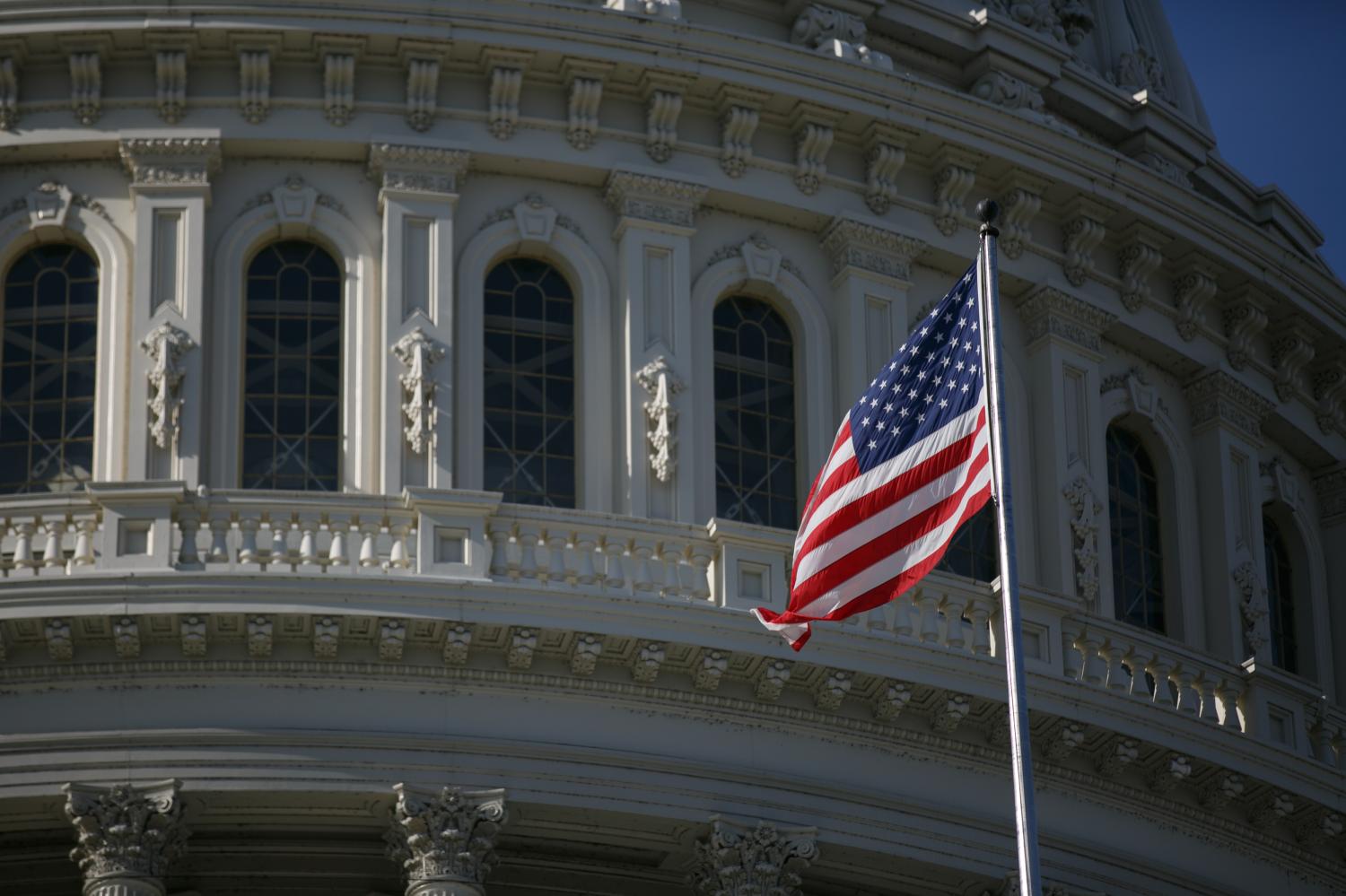

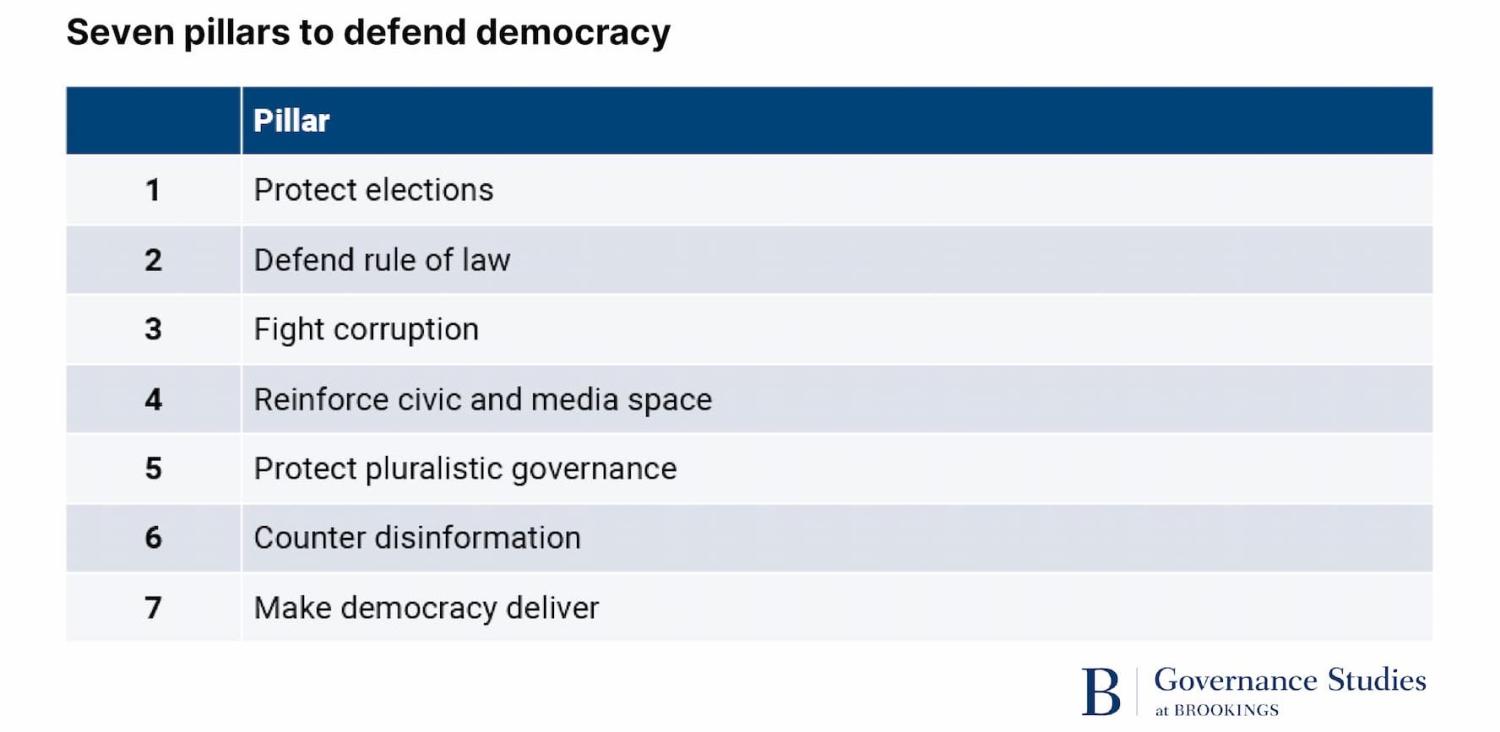
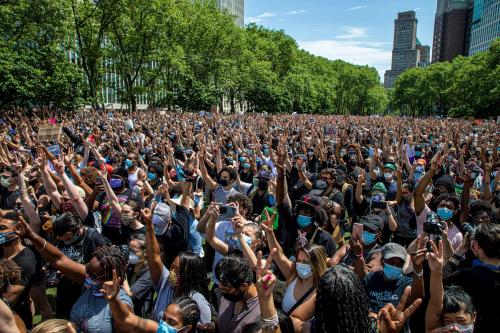
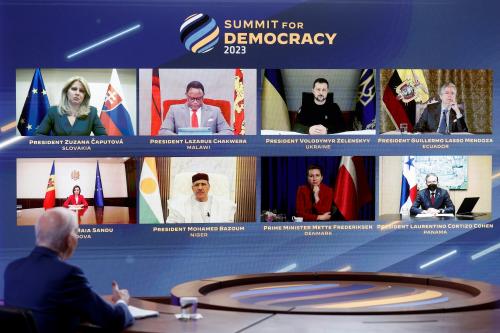
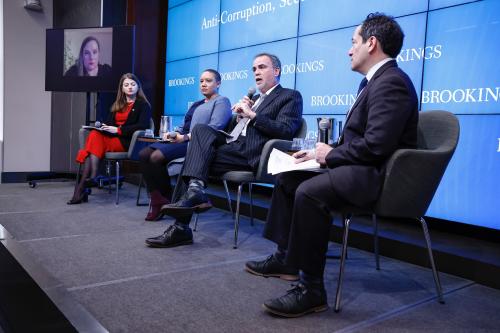

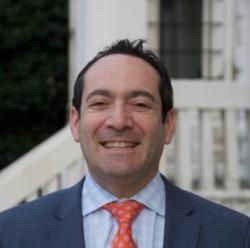



Commentary
Op-edDangerous cracks in US democracy pillars
February 13, 2025